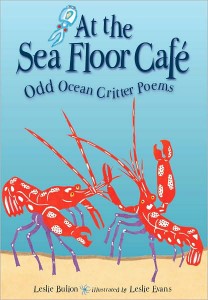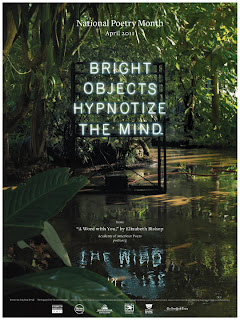Today we have a guest post by the lovely Elizabeth Dunn-Ruiz. Elizabeth was a classmate of mine during the MFA and writes beautiful poetry as well as heartbreaking teen literature. She is also poetry editor of Verbal Pyrotechnics, a literary magazine dedicated exclusively to teen literature. So if you have poetry that appeals to a teen audience, feel free to check out the submissions page and send it her way. For more about Elizabeth, visit her blog at: A Lil’ Sumpin’ Sumpin’. And now here’s Elizabeth’s take on why people hate on poetry.
 Some people are scared of sharks, others of heights, an intruder in the night. Sure, a fearfulness of all of these things make sense; each could kill you after all. But why, then, are so many writers of fiction afraid of poetry? What has a poem ever done to you? Huh?
Some people are scared of sharks, others of heights, an intruder in the night. Sure, a fearfulness of all of these things make sense; each could kill you after all. But why, then, are so many writers of fiction afraid of poetry? What has a poem ever done to you? Huh?
Okay, maybe it’s bored you, confused you, made you feel something you weren’t prepared to feel, but it certainly has not killed you! In fact, I’d argue that some poems are more scared of you than you are of them. Like this one, called “Poem that Begs for Reassurance”, by Peter Davis*:
My experience with the world around me is that I either feel it’s awful, or I feel that it is great. Right now I feel like this poem is awful. I feel like I am awful. I feel like an outcast in the literary world. Nobody reviews my work. As far as I can tell, nobody really talks about me. They do, but it’s never enough. I’m not besieged with e-mails soliciting my poetry. I keep waiting for something to happen. I mean, this is a good poem. Other people seem to have so much going on. I read their bio notes and think, “Well, jeez, how do they all do it?” I say to my wife, “Honey, I always feel a few steps behind. How can I do all of that in this poem?” Some of them maintain blogs with numerous links and a lot of daily hits. Others don’t even have blogs! All around me poets are winning prizes and being included in anthologies like The Best American Poetry. Some at very young ages. Some of these people, if they don’t already have tenure-line teaching positions, are very strong candidates for tenure-line teaching positions.
Now, before that familiar fear bubbles to the surface, turns itself into rage and makes you shout What? That’s not even a poem! Stop, and breathe. And try and keep in mind that a poem is simply compressed language used to express emotion or ideas.
Perhaps in high school some archaic, convoluted, and important poem was paraded in front of you so that you–in a role of simple spectator–could analyze it, elucidate its virtues and confirm its place in the canon. The teacher didn’t ask you to get in there and walk around with the poem, hold its hand, listen to its secrets and share yours in return. No, you were just supposed to coolly observe it, as if it were the other, then write a five paragraph essay, sans the word “I”. Maybe it was then that you decided that poetry, like AP Calculus or showering in the locker room, was just not for you.
Billy Collins, America’s Poet Laureate from 2001-2003, in conjunction with the Library of Congress, created Poetry 180, a collection of poems to be read aloud, one a day for all 180 days of the school year, in an attempt to demystify, de-stress-ify, de-analyze-ify poetry and help us all simply experience and, perhaps even, appreciate poems. The first poem in this series is his, and, fittingly, it is called “Introduction to Poetry” and I think it is awesome. He writes:
I ask them to take a poem
and hold it up to the light
like a color slide
or press an ear against its hive.
I say drop a mouse into a poem
and watch him probe his way out,
or walk inside the poem’s room
and feel the walls for a light switch.
I want them to waterski
across the surface of a poem
waving at the author’s name on the shore.
But all they want to do
is tie the poem to a chair with rope
and torture a confession out of it.
They begin beating it with a hose
to find out what it really means.
We have been conditioned to think there is a right and a wrong response to a poem, that it can only mean one thing, when in fact that is not true at all. When the pressure of analysis is removed, I think many of us who claim to dislike Poetry-with-a-capital-P are actually surprised to find that many poems are you know, quite likeable.
I find that reading a few poems in a variety of styles before I sit down to write can help me generate ideas and approach my language differently. Poetry compresses ideas, emotions, and images into very few words and this is a skill that all writers can benefit from. Look at this poem by Jane Kenyon:
Otherwise
I got out of bed
on two strong legs.
It might have been
otherwise. I ate
cereal, sweet
milk, ripe, flawless
peach. It might
have been otherwise.
I took the dog uphill
to the birch wood.
All morning I did
the work I love.
At noon I lay down
with my mate. It might
have been otherwise.
We ate dinner together
at a table with silver
candlesticks. It might
have been otherwise.
I slept in a bed
in a room with paintings
on the walls, and
planned another day
just like this day.
But one day, I know,
it will be otherwise.
In it she compresses a life into a few short images. The first introduces us to a character, a domestic setting, and, through the use of one key word, “strong”, indicates that she is grateful for her current health. Her use of repetition emphasizes the idea that we all make choices about how to live life. The slight modification to the repeated sentence powerfully implies that the speaker appreciates the choices she has made and the life that she leads as a result of those choices.
The content of this poem could have been the subject of a short story or novel, but Kenyon seems to want the reader to focus on the simple moments of a life and so she uses simple diction and sentence structure. The moments she describes, just like the poem itself, are quick and could be easily overlooked, but she is asking the reader to be attentive to the simple moments that make up a life. This poem illustrates that the structure is the message too.
As you approach your own work it is important to ask your self if your container is the right size for your content and if it’s not, adjust accordingly. You would never pack your son’s sandwich in a suitcase and send him off to school, now would you?
Another reason to read poetry is the playfulness with which many poets approach language. Not to say that a poem is any less literary when it employs whimsy, simply that it is important to remember that language is not just about ideas, but is just as much about sound. Take this line from Thomas Sayers Ellis’ “Presidential Blackness”, a serious poem about race and language, “…a new infinite alphabet pours from the pores of the poor…”. The cleverness of the wordplay is going to make this line jump out. It will stick with the reader because, well, it sounds good and it is fun to say. I encourage you to read your work aloud or ask a friend to read it aloud to you; consider revising anytime you need to take a breath or your friend stumbles. Listen for interesting juxtapositions and pay attention to your sentence structure. Just like my mother always said, “It’s not what you say, but how you say it, that matters.”
*I’d imagine that Peter Davis and this poem are presently feeling reassured, as he was just in town to launch the Best American Poetry 2010, in which he has four (wonderful) poems.















 Call me Gabi (pronounced gah-BEE). I'm a writer, freelance teacher, and a lover of books and words. I'm also the instigator of DIY MFA. iggi's my sidekick, but he thinks he's the brains behind this operation.
Call me Gabi (pronounced gah-BEE). I'm a writer, freelance teacher, and a lover of books and words. I'm also the instigator of DIY MFA. iggi's my sidekick, but he thinks he's the brains behind this operation.
 ROW80 Check-In (4)
ROW80 Check-In (4) YA Cafe Book Club: The Unbecoming of Mara Dyer
YA Cafe Book Club: The Unbecoming of Mara Dyer YA Cafe: Building Suspense
YA Cafe: Building Suspense